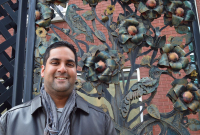Support strong Canadian climate journalism for 2025
OakvilleReady is a program inspired by the efforts of the national interfaith environmental network Faith & the Common Good to take care of the most vulnerable in climate emergencies and extreme weather events.
The idea is to utilize neighbourhood faith-based buildings as “resiliency hubs” — places where community members can go for safe haven from ice storms, power outages or extreme localized flooding, but also spaces to learn about weather preparedness by building climate-ready infrastructure, both social and physical. This could include anything from teaching participants personal preparedness to establishing community gardens that counter food insecurity.
A partnership between the Town of Oakville, Ontario and the non-profit Halton Environmental Network (HEN), OakvilleReady is volunteer-based. Set up in 2019, Lisa Kohler, former HEN executive director, explains how the program deepens the impact of the communities they work with.
“OakvilleReady builds knowledge and climate resilience,” she says. “It offers opportunities for participants to build their own community benefits by taking action, such as by removing concrete and replacing it with gardens that prevent stormwater runoff, retrofitting buildings and so on.”
OakvilleReady’s inaugural year focused on engaging faith organizations and neighbours in the program and developing town-wide risk and vulnerability mapping to properly place the first cohort of hubs.
Then COVID hit, putting a damper on the program.
“One of the first calls I had from a hub was, ‘What can we do to help?’” Kohler recalls. “So, we made OakvilleReady a virtual space and continued building capacity.”
At the start of the pandemic, programming focused on providing information to hubs on how to use the various communication platforms — like Zoom, Facebook Live and Google Meet to host meetings, masses and prayer sessions, as well as webinars on topics such as gardening and cooking from your pantry.
The hubs have phone trees and were able to call and check in on their congregants.
Grocery runs were organized for seniors and other vulnerable populations. At one hub, participants planted a pollinator garden with their kids, and from there, planters for balconies and countertops took on a life of their own.
Out and about in the town, at a day-long competition where hub leaders were judges, the program engaged high school students in creating kits and a renewable energy gadget that people could use to charge their cellphones (solar charging stations).
“These sorts of fun activities can lead into more serious conversations about climate resilience,” says Kohler.
“One thing I enjoyed watching is how the adaptation report for the town really contextualized what climate change impacts,” Kohler says. “We have shared that resource to the hubs. The way that info can be disseminated through the hubs is powerful. It’s not static, it’s consumed more authentically. These hubs are a conduit from the experts to the community.”
Trisha Henderson, the Town of Oakville’s environmental co-ordinator, talks about the value to the community that the program offers; it is supported by both the town and the region’s emergency management departments. “Development of the OakvilleReady program was an action of the town’s 2014 climate change strategy as it provides a very important avenue for community climate preparedness, response and recovery,” she says.
For Henderson, stakeholder partnerships are critical: “It is difficult for the town to do this work on its own, if not impossible,” she says. “We didn’t get it off the ground until HEN took it on.”
Next steps
The pandemic carries on and OakvilleReady continues building community connectedness. It recently ran its fourth food drive and is going back into the hubs to engage them throughout the year with monthly team meetings. Two new hubs joined the eight established sites this year.
Andrea Rowe is the new addition to the team, working in the role of project manager and promoting the program across the town. Rowe has prepared a communications plan that focuses on making sure residents are ready with personal preparedness kits (for the first 72 hours) that include blankets, water, food, batteries and so on.
“Even though it is intended to address extreme weather, we take the opportunity to strengthen the community in various ways,” Rowe says. “So, we are also connecting around what a community needs, what the pressing issues are.”
Rowe is interested in exploring further the question of how we build neighbour-to-neighbour connections (for example, early adopters of the program went door to door, talking to people).
“The point is that you are not only looking after yourself but your neighbour as well. Because we have to look after one another.”
Beatrice Ekoko is the chief storyteller and social media specialist at Faith & the Common Good. She also works with the non-profit, Environment Hamilton's Pollinator Paradise Project.






Comments
https://cornwallalliance.org/
Religion is extraneous, an interloper that doctrinally sanctions the idea that man's dominion over nature is what "God" intended, all alternate interpretations aside.
https://www.washingtonpost.com/blogs/blogpost/post/dominionism-a-danger…